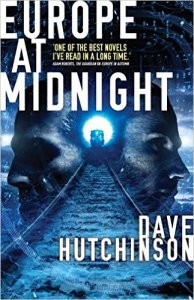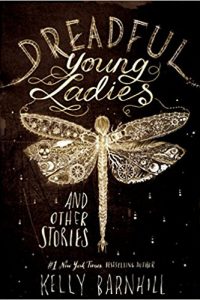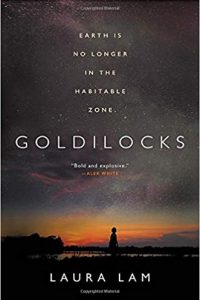James Bradley reviews Dave Hutchinson
Europe at Midnight, Dave Hutchinson (Rebellion 978-1781083987, $7.99, 384pp, pb) November 2015.
 Dave Hutchinson’s Europe in Autumn was one of the real delights of 2014, a perfectly pitched riff on the spy thriller that married the shifting realities of Christopher Priest to a blackly comic vision of the absurdities and contradictions of European nationalism.
Dave Hutchinson’s Europe in Autumn was one of the real delights of 2014, a perfectly pitched riff on the spy thriller that married the shifting realities of Christopher Priest to a blackly comic vision of the absurdities and contradictions of European nationalism.
Now, 18 months later, we have Europe at Midnight, a novel set in the same universe (or universes), which takes both the concept and the politics that made the first book so interesting and amplifies it.
Although its title suggests it is a sequel, it isn’t, and neither is it a prequel. Instead – to borrow the metaphor of the railway that helped structure Europe in Autumn – it’s perhaps best understood as a separate but convergent line in the same network, its narrative traversing different terrain before finally intersecting with the narrative of the first book.
As such, its setup will be familiar to those who have read Europe in Autumn. It’s a few decades from now, and Europe is in the process of fracturing into scores of ever-smaller polities. Some of these new micro-states are assertions of traditional privilege, micro-states set up by ‘‘Romanov heirs and Habsburg heirs and Grimaldi heirs and Saxe-Coburg Gotha heirs and heirs of families nobody had ever heard of who had been dispossessed sometime back in the fifteenth century’’; others are little more than excuses to fence off bits of countryside or cities on behalf of thousands of microethnic groups who suddenly want European homelands as well, and religious groups, and Communists, and Fascists.
This process – which has been hastened by ongoing economic malaise and (significantly, it turns out) a devastating flu epidemic – has also led to proliferating bureaucracy and border controls, as these micro-states seek to control (and often profit from) the flow of people and goods across their territory (and as the current influx of Syrian refugees continues to expose the imbalances and contradictions in Europe’s governance, this looks more prescient with each passing week).
Much of the action of Europe in Autumn focused on these borders, or more particularly ‘‘Les Correurs des bois’’ or ‘‘Couriers,’’ a stateless organization of spies and fixers who specialize in circumventing the mechanisms set up to control those borders, a focus that allowed the novel to explore both the physical and psychic landscapes of a fractured Europe and the degree to which borders (and indeed maps) are really expressions of particular sorts of power.
But alongside these more conventional elements, Europe in Autumn introduced another, significant wrinkle (those who wish to enjoy the novel without knowing its big reveal in advance may want to stop reading now) in the form of the Community, a secret nation sequestered in a pocket dimension that abuts the real Europe and that was magicked into being by eccentric English cartographers in the 19th century.
Although much of the action of Europe in Autumn turns on the maneuverings of various groups seeking to uncover the secret of the Community’s existence (and the unveiling of its nature serves as the big reveal of the novel’s final pages) it is front and center in Europe at Midnight, much of whose action takes place in this parallel dimension.
Interestingly – and significantly – the novel does not open in the Community itself. Instead it opens in a peculiarly bleak and impoverished place known as the Campus, a tiny world unto itself that seems to exist in order to carry out various kinds of research. As the story begins, the Campus is in the process of trying to recover some kind of stability after the overthrow of its former government, a process that has seen the novel’s narrator, a former Literature professor, take up the position of Professor of Intelligence, a job that has placed him in the invidious position of attempting not just to root out the secrets and sympathizers of the old regime, but of being responsible for imposing order on the malnourished and increasingly restive population of the new.
Only ever identified as Rupert – in a rather lovely flourish he introduces himself as ‘‘Rupert of Hentzau’’ during an operation early on (‘‘I’d been reading too much Anthony Hope’’), invoking the fictional nation of Ruritania – the narrator soon finds himself investigating evidence of horrific research involving genetic engineering and biological warfare, a line of enquiry that sees him stripped of his position and, after an attempt on his life by the forces behind the research, leads to him deciding to flee the Campus for the outside world.
The action then shifts to the ‘‘real’’ world of England, where Rupert resurfaces, taken into the custody of the secret services after he is stabbed by what seem to be operatives of a group representing interests allied to those whose existence he uncovered back in the Campus, an event that leads to him agreeing to work with the security services to help unravel the question of who or what is behind the efforts to keep the Community’s existence a secret.
Like Europe in Autumn, Europe at Midnight derives at least some of its effect from its shifting perspective and jumps in time, as Rupert shuttles between background and foreground, and the action shifts from the Campus to Europe and England and then back to the Community itself. Although part of the pleasure of the book lies in the unraveling of its various threads, there are moments when the result is more than a little destabilizing, particularly as the narrative proceeds, and Rupert’s work takes him deeper into the world of the Community. Yet it also points to the book’s larger interest in the malleable nature of social reality, the degree to which both national and personal identity are constructed and deconstructed, and to the degree to which these processes are hostage to the agendas of the powerful.
Given its subject matter, it should come as little surprise that Europe in Autumn often reads like a loving and perfectly pitched homage to the thrillers of the Cold War, and those of Le Carré in particular. Like Le Carré, Hutchinson is keenly attuned to the hypocrisy and casual brutality of power. And, also like Le Carré, he is deeply skeptical of Englishness, and the way the ‘‘dream of the perfect England’’ embodied by the Community disguises not just the ruthlessness of its rulers, but also the degree to which the Community’s order serves to protect those who occupy the upper echelons of its social order.
Yet, in a way, what is most striking about Europe at Midnight is not the hard edge of its politics, or even the casual brilliance of its science fictional reworking of the political thriller, but Hutchinson’s thrillingly assured control of his material. Hutchinson writes wonderfully, his prose animated not just by a keen eye for character, but by a blackly witty sense of humor, qualities that make Europe in Autumn both darkly entertaining and disturbingly timely.






